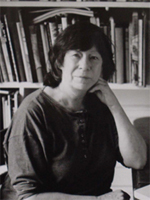LaURa MuLVeY...sUmMaRy..x
Laura Mulvey was a feminist academic and media & film critic - she was responsible for developing th
 eories of the male gaze in her essay 'Visual Pleasure & Narrative Cinema' in 1975.
eories of the male gaze in her essay 'Visual Pleasure & Narrative Cinema' in 1975.The term 'male gaze' is one which she used to desribe what she felt was the male point of view constructed by the camera for the benefit of an assumed male audience. She also argued that even the women in the audience were forced to be positioned by the narrative in order to see the world through a male perspective. Mulvey also felt that women are nearly always portrayed in passive roles whereas men are always central and active characters in the text and hold higher statuses in comparison. Therefore, she felt that women are either portrayed as housewives etc.. or as sex objects. Being represented as housewives etc... promotes the idea of 'patriarchy'. This is a form of society ruled by men through the 'father figure' to whom all others are subordinate - therefore showing a patriarchal society to be one where the men dominate and the media are constructed as their audience. Women are depicted as sex objects because the focus of the camera on certain attributes of their bodies - referred to as fetishistising showcases their bodies to be used for the gratification of men. Mulvey argues that cinema audiences look at films in two different ways voyeristically & fetishistically.
HoW tHiS tHeOrY aPpLiEs tO 'BriDe & PreJuDiCe'..x

'Bride & Prejudice' features Aishwarya Rai as the leading protagonist of the film. Although in a way this could give her a sense of power and makes the audience identify with her as she is in a central and active role - it can still be argued that she has been deliberately used for this role to satisfy the male gaze as she has a quality of to-be-looked-at-ness. There are times in the film where this idea may be emphasised as certain parts of her body are fetishised by the use of semi revealing or tight clothing. The idea of 'patriarchy' can be related to this text as it features a very stereotypical Asian attitude at times - especially in terms of marriage. This theme of marriage is a key aspect to this film as it is a main issue covered - it helps to showcase the idea of patriarchy as the protagonists father and most of the other male characters seem domineering as they feel what they expect should be done without argument. In many ways though Mulvey's theory is subverted by this text as the Asian women in this film all hold a strong presence and do not adopt to traditional roles women would be expected to fulfill. Also, even though the women in this text may come across as objects as the male gaze as they are beautiful and hold the quality of to-be-looked-at-ness they are still strong, independent women aware of their good looks and how to operate them - known as post - feminism.

0 Comments:
Post a Comment
<< Home